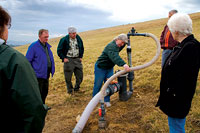A group of camera-toting travelers breezed through Western North Carolina recently, but they weren’t looking to capture stunning Parkway views. Instead, they took a whirlwind tour of our local dumping grounds.

Spearheaded by The Mountain Institute, a nonprofit working on rural-community development in West Virginia, the tour was designed to give landfill managers a chance to learn about methane-recovery projects. Visits to Buncombe County’s present and former Woodfin landfill sites showcased systems for capturing methane—a potent greenhouse gas—before it escapes into the atmosphere. The county’s landfills, it turns out, are setting a green standard in the Southeast.
Denese Ballew, who oversees environmental management at the current landfill, showed off the bioreactor, which is recognized by the U.S. Environmental Protection Agency as a model for environmental leadership. Using a system of trenches and pumps, it cycles leachate through the capped piles of garbage to accelerate decomposition. The bioreactor maximizes landfill space while increasing the amount of methane that can be tapped from the trash heaps.
And more methane may translate into more money. The Buncombe County landfill, says Ballew, has applied to join the Chicago Climate Exchange, a greenhouse-gas trading system. In essence, this would pay the county for what it’s already doing: burning off the methane to reduce the contribution to climate change. Companies such as American Electric Power or DuPont buy “carbon credits” generated by the displaced methane to offset their own carbon emissions. In the absence of federal carbon regulations, the trading system provides a financial incentive to reduce overall greenhouse-gas emissions.
The going rate for carbon credits is in constant flux, but Ballew estimates that the landfill could bring in as much as $138,000 a year. “That money would stay in the solid-waste budget,” she explains, “and go toward future development of landfill-gas projects.”
Meanwhile, at the nearby former landfill, Enerdyne Power Systems uses captured methane to produce electricity. Each year, the company sells about one megawatt to the grid through the statewide NC GreenPower program.
Brent Bailey, director of The Mountain Institute’s Appalachia Program, believes these financial incentives will pave the way for similar greenhouse-gas-reduction programs in West Virginia. “It’s about community development,” he says. “These programs give rural communities access to an inexpensive, alternative fuel while providing an opportunity to tap into burgeoning global markets.”
Sustainability is the MAIN thing
Equal parts Internet-service provider, Web host, independent-media advocate and the driver behind local radio station WPVM, the Mountain Area Information Network is also an online nexus for Western North Carolina’s activist community. The MAIN Web site, a popular go-to spot for local happenings and progressive news, just got a green twin: Sustainable WNC.
Operating under MAIN’s umbrella but with a separate link (www.sustainablewnc.org), the new online directory is styled “The Gateway to Sustainability in Western North Carolina.” Featuring blogs by local energy and environmental experts, links to green organizations, and a community calendar, the volunteer-based project seeks to link “all the different folks working on all the unique aspects of sustainability,” according to MAIN Executive Director Wally Bowen.
Web site visitors will be able to publicize events and post photographs and comments. “We want people to be able to share their stories,” says Bowen, adding that Sustainable WNC is “an early venture into citizen journalism” for MAIN. The idea for the “Internet portal,” as Bowen calls it, came out of last summer’s Design Science Lab at UNCA.
Two other Web sites created in recent months—Sustainable Asheville (www.sustainableasheville.org) and Sustainable Now (http://sustainablenow.us)—also aim to bolster the region’s environmental movement. Asked if Sustainable WNC would compete with the other sites for Web traffic, Bowen replied: “We see ourselves as a gateway to those other Web sites. They’re very complementary.”





Before you comment
The comments section is here to provide a platform for civil dialogue on the issues we face together as a local community. Xpress is committed to offering this platform for all voices, but when the tone of the discussion gets nasty or strays off topic, we believe many people choose not to participate. Xpress editors are determined to moderate comments to ensure a constructive interchange is maintained. All comments judged not to be in keeping with the spirit of civil discourse will be removed and repeat violators will be banned. See here for our terms of service. Thank you for being part of this effort to promote respectful discussion.